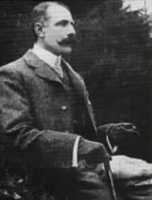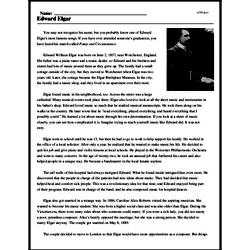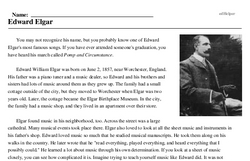Edward Elgar
You may not recognize his name, but you probably know one of Edward Elgar's most famous songs. If you have ever attended someone's graduation, you have heard his march called Pomp and Circumstance.
Edward William Elgar was born on June 2, 1857, near Worchester, England. His father was a piano tuner and a music dealer, so Edward and his brothers and sisters had lots of music around them as they grew up. The family had a small cottage outside of the city, but they moved to Worchester when Elgar was two years old. Later, the cottage became the Elgar Birthplace Museum. In the city, the family had a music shop, and they lived in an apartment over their store.
Elgar found music in his neighborhood, too. Across the street was a large cathedral. Many musical events took place there. Elgar also loved to look at all the sheet music and instruments in his father's shop. Edward loved music so much that he studied musical manuscripts. He took them along on his walks in the country. He later wrote that he "read everything, played everything, and heard everything that I possibly could." He learned a lot about music through his own determination. If you look at a sheet of music closely, you can see how complicated it is. Imagine trying to teach yourself music like Edward did. It was not easy.
Elgar went to school until he was 15, but then he had to go to work to help support his family. He worked in the office of a local solicitor. After only a year, he realized that he wanted to make music his life. He decided to quit his job and give piano and violin lessons at local schools. He played in the Worcester Philharmonic Orchestra and went to many concerts. At the age of twenty-two, he took an unusual job that furthered his career and also helped people in a unique way. He became a bandmaster in the local lunatic asylum.
The tall walls of this hospital had always intrigued Edward. What he found inside intrigued him even more. He discovered that the people in charge of the patients had new ideas about music. They had decided that music helped heal and comfort sick people. This was a revolutionary idea for that time, and Edward enjoyed being part of their program. Edward was in charge of the band, and he also composed music for hospital dances.




